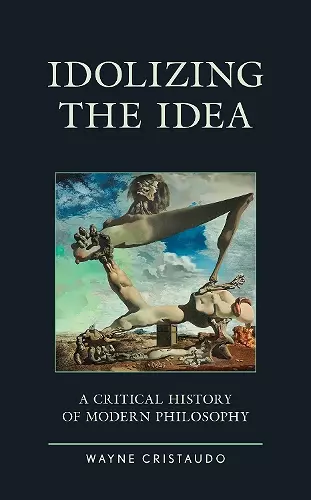Idolizing the Idea
A Critical History of Modern Philosophy
Format:Hardback
Publisher:Lexington Books
Published:15th Oct '19
Currently unavailable, and unfortunately no date known when it will be back
This hardback is available in another edition too:
- Paperback£35.00(9781793602374)

Ever since Plato made the case for the primacy of ideas over names, philosophy has tended to elevate the primacy of its ideas over the more common understanding and insights that are circulated in the names drawn upon by the community. Commencing with a critique of Plato’s original philosophical decision, Cristaudo takes up the argument put forward by Thomas Reid that modern philosophy has generally continued along the ‘way of ideas’ to its own detriment. His argument identifies the major paradigmatic developments in modern philosophy commencing from the new metaphysics pioneered by Descartes up until the analytic tradition and the anti-domination philosophies which now dominate social and political thought. Along the way he argues that the paradigmatic shifts and break-downs that have occurred in modern philosophy are due to being beholden to an inadequate sovereign idea, or small cluster of ideas, which contribute to the occlusion of important philosophical questions. In addition to chapters on Descartes, and the analytic tradition and anti-domination philosophies, his critical history of modern philosophy explores the core ideas of Locke, Berkeley, Malebranche, Locke, Hume, Reid, Kant, Fichte, Hegel, Schelling, Marx, Kierkegaard, Schopenhauer, Nietzsche, Husserl and Heidegger. The common thread uniting these disparate philosophies is what Cristaudo calls ‘ideaism’ (sic.). Rather than expanding our reasoning capacity, ‘ideaism’ contributes to philosophers imposing dictatorial principles or models that ultimate occlude and distort our understanding of participative role within reality. Drawing upon thinkers such as Pascal, Vico, Hamann, Herder, Franz Rosenzweig, Martin Buber and Eugen Rosensock-Huessy Cristaudo advances his argument by drawing upon the importance of encounter, dialogue, and a more philosophical anthropological and open approach to philosophy.
“Written with wit, integrity, and a magisterial grasp of the history of ideas, Wayne Cristaudo shows that the most famous and influential philosophers have seldom displayed true love for wisdom, but usually succumbed to the temptation to interpose their own pet theory between mind and object. His alternative account reveals that several barely known but badly neglected minds from the past have taken a more open and dialogic approach to philosophy; these true thinkers have beheld the phenomena of reality with genuine reverence, gained profound insights, and offer much needed intellectual sanity and spiritual ballast for these troubling times.” -- Nalin Ranasinghe, Assumption College
“Rarely does one find a wholesale philosophical critique of modern progressive radicalism that deserves to be pondered over and reckoned with by those on the left who feel the need to temper their conviction with sobriety. In Idolizing the Idea Wayne Cristaudo offers just such a critique, with his characteristic perspicacity, erudition, and bite.” -- Jiwei Ci, The University of Hong Kong
“This is an extraordinary, timely, and original work, that few scholars working in the academies could produce in our times. In depth and breadth, though not in content, it recalls the works of Alasdair MacIntyre and Charles Taylor. It is the sort of book that could only be written by a very senior scholar who has over a life time understood and appropriated the full range of debates in the history of ideas and proffered a novel voice on philosophical and political themes from the Enlightenment through to contemporary concerns. The power of Cristaudo’s vision is matched by the careful detail of his analyses and the evaluation of our contemporary predicaments. There will be much that will be the source of disagreement and further argument arising from this book but there is more importantly much to be learned and reflected upon in this opus magnum.” -- Brian Mooney, Charles Darwin University
ISBN: 9781793602350
Dimensions: 228mm x 166mm x 31mm
Weight: 712g
344 pages